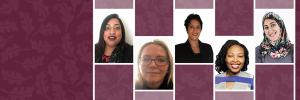
'Warrior Women' on the Covid-19 frontline
"When things were difficult, I took pride in the amazing team of mostly women. Strong women doing their best," said Dr Usha Lalla, an intensivist working right on the Covid-19 frontline in Tygerberg Hospital's Intensive Care Unit. "Women, who in the darkest times cried together, laughed together, even danced together."
Lalla was one of five 'Warrior Women' who spoke of their experiences in fighting Covid-19 in an uplifting and insightful webinar hosted by the FMHS Women's Forum as part of their Women's Month activities. The webinar was chaired by Prof Sharon Kling from the FMHS Department of Paediatrics and Child Health, and Prof Keymanthri Moodley, Director of the Centre for Medical Ethics and Law at the FMHS. The speakers shared their fears, the challenges they faced while fighting an unknown assailant while also juggling family responsibilities, and lessons learnt during this tumultuous period.
Describing it as "the pandemic juggle", Dr Nadiya Ahmed of the hospital's Critical Care Unit said: "It's not new – we have been juggling all along, but the pandemic added another ball. In addition to a doctor, I'm a wife, mother, daughter and daughter-in-law – during the pandemic, commitments included Ramadan, two Eids, my 40th birthday, 12th Wedding Anniversary and my child's birthday."
"I'd love to say I achieved life-work balance, but I didn't. And I experience a lot of guilt about my family," said Lalla. "But I keep reminding myself that children are resilient and I'm doing my best."
"It's been an intense seven months," added Dr Arifa Parker of the Infectious Diseases Division. "One virus has changed the world. I'm uncomfortable with the 'Warrior Women' label used to describe us in this webinar. We are just being women – treating people with kindness and compassion."
"You have to be humble," she continued. “None of us are Covid-19 experts. You have to learn, unlearn, relearn."
She described how her department started planning in January when they had their first suspected patient.
"We didn't know what we were getting ourselves into," she said. "We had to unlearn what we thought we knew."
Fast adaptation was key and initial reams of paperwork were whittled down to a one-page protocol, while the flow process designed to avoid cross infection has been adopted across the province.
"It was difficult in the early days," said Ahmed. "We had to find inventive ways of doing things. Cancer didn't stop, other critical diseases didn't stop. We played musical beds."
She described walking around the hospital to find equipment to be re-purposed.
The physical challenges were immense. Lalla indicated that the Covid-19 ICU started with seven beds and 60 staff, but now has 32 beds and 190 staff, accommodating 340 patients since March.
"It was controlled chaos. Every day brought challenges despite meticulous planning," she said. "This disease is crazy, not textbook. It didn't follow any rules causing helplessness, frustration and despondency. Not being able to help everyone was soul destroying."
"But there were also highs," said Lalla. "Our first patient discharged after intubation and ventilation was one. This brought hope – light at the end of the tunnel. Another was introducing high-flow nasal oxygen – a relief because it allowed patients to communicate."
Team work makes the dream work
All the speakers stressed the importance of teamwork.
"To keep the ship afloat, find the people you can count on to make a plan," said Ahmed.
"We had to accept our limitations," said Dr Nonte Mhlana who joined the Covid-19 Unit in April. "You couldn't use what you had learnt in training. We didn't know enough. You have to ask for help, be flexible, open to learning and adjusting."
"The challenges have been fear and anxiety along with physical and mental exhaustion," she said. She also spoke of missing the physical support of family, but at the same time said she was grateful they were in another province because she did not to have to worry about bringing infection to her family.
In addition to sometimes 24-hour patient care, staff safety had to be ensured through personal protective equipment (PPE) and infection-control guidelines and training, the academic programme continued, and experiences were documented to enhance the evidence base.
Dr Suretha Kannenberg of the FMHS' Division of Dermatology has been actively involved in various volunteer and support activities in the hospital since the start of the pandemic. She described the student-volunteer programmes ranging from babysitting, call centre work, contact tracing, screening, admin and data capturing, to making masks, spacers and visors to use for PPE. She also acknowledged the ongoing donations from community groups and businesses.
The presenters emphasised that Covid-19 has once again unmasked historic inequalities, not least the need for female voices.
"Where are the women experts?" asked Parker, "I'm surrounded by amazing women. We must use our voices."
Caption: Drs Nadiya Ahmed, Suretha Kannenberg, Usha Lalla, Nonte Mhlana and Arifa Parker.
